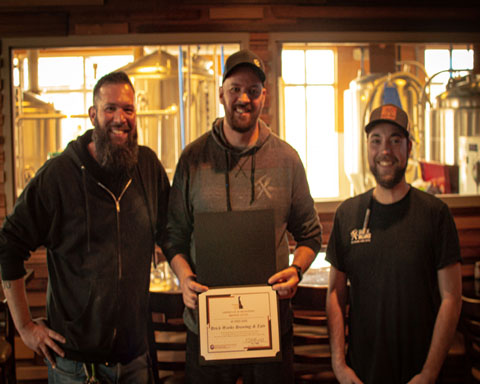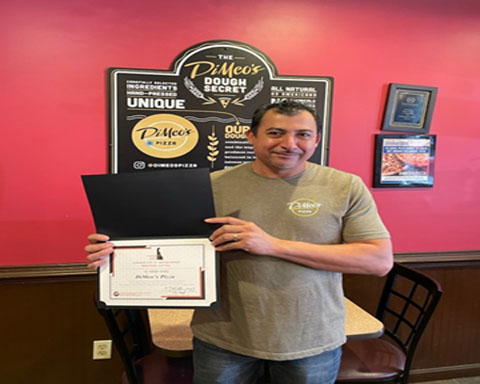DHSS Press Release
Molly Magarik, Secretary
Jill Fredel, Director of Communications
302-255-9047, Cell 302-357-7498
Email: Jill.Fredel@delaware.gov
DPH Media Contact:
Tim Turane
Email: DPHMedia@Delaware.gov
Date: March 15, 2022
DHSS-3-2022

Mark Black of Brickworks Brewing and Eats in Smyrna, DE, holds the restaurant’s Bronze level certificate for the Restaurant Accolade Program.
Pictured from left to right are Ronald E. Harper Jr, Mark Black, and Jefford McCutcheon.

Wenceslao Pinto of DiMeo’s Pizza in Smyrna, DE holds the restaurant’s Bronze level certificate for the Restaurant Accolade Program
DPH ANNOUNCES LAUNCH OF RESTAURANT ACCOLADE PROGRAM ADDRESSING SUBSTANCE ABUSE PREVENTION, OPIOID OVERDOSE IN RESTAURANT INDUSTRY
DOVER, DE (March 15, 2022) – The Division of Public Health’s (DPH) Office of Health Crisis Response (OHCR), has initiated a Restaurant Accolade Program to train and educate restaurant industry staff on how to reverse an opioid overdose and support coworkers with substance use disorder (SUD). The program was developed to assist restaurants, hospitality groups, and other food service industry workers across the state, while working to combat the stigma often associated with SUD.
The creation of the Restaurant Accolade program was informed by the results of Delaware’s first Drug Overdose Mortality Surveillance Report published in August 2019. The report more narrowly guided the state’s efforts to effectively decrease substance abuse and opioid-related mortality and treat SUDs. The report examined data on drug overdoses that occurred in the state in 2017. Analyses in the report found that 10% of Delawareans who died of a drug overdose in 2017 were employed in the food services industry.
“It’s heartbreaking to know that among the 447 Delawareans who died of a drug overdose in 2020, that individuals within food service industry were among those more heavily impacted,” said DPH Director Dr. Karyl Rattay. “The hard-working individuals in our state need to be aware of the steps necessary to reverse or prevent overdoses that could affect their co-workers. The Restaurant Accolade Program is a great way for businesses to take care of their employees and provide a method for employers to remain informed on the opioid crisis.”
“Anecdotally, restaurant employees and hospitality group managers have noted that there is an increased risk of opioid use among restaurant workers industry-wide,” said Mark Black from Brick Works Brewing & Eats in Smyrna. His restaurant is participating “because this is a problem we can no longer ignore.”
The Restaurant Accolade Program teaches staff in the food service industry how to respond to an opioid overdose and helps restaurants create policies and workplace environments to support employees and patrons struggling with SUD.
Restaurants and food service establishments progress through three levels of hands-on training to receive certification and recognition:
Bronze Level: Key staff are trained in how to recognize the signs of an opioid overdose, administer NARCAN® nasal spray, and connect with Emergency Medical Services (EMS) for additional assistance. All trained staff members and the establishment receive a personal Opioid Rescue Kit. Restaurants who complete the Bronze Level training receive a certificate of achievement and a Bronze window-cling decal to identify the establishment as a member of the Restaurant Accolade Program.
Silver Level: One to two individuals in the restaurant are trained to be peer supporters for their co-workers. These individuals are educated by DPH about opioids, addiction, and overdose, as well as key strategies to reduce stigma against individuals with substance use disorder. Peer supporters also will be educated about local treatment options and resources for individuals with substance use disorders so that they can support and assist co-workers who may be in need of these services. Restaurants who complete the Silver Level training receive a certificate of achievement and a Silver window-cling decal for the establishment.
Gold Level: General managers and human resources personnel receive training and support in developing policies and procedures that create an accepting environment for individuals in recovery, combat the stigma of addiction, and promote a drug-free workplace. DPH works with these personnel to assess restaurants’ current policies and environment and provide tailored assistance to these individuals. Restaurants who complete the Gold Level training receive a Gold Award, along with a certificate of achievement and a Gold window-cling decal and an award to be featured in the establishment.
Several restaurants across the state have already achieved the Bronze Level training as part of initial outreach done by OCHR:
- Brick Work Brewing & Eats, 230 S Dupont Blvd., Smyrna, DE 19977
- The Celtic Pub, 699 Jimmy Drive – Suites 6 & 7, Smyrna, DE 19977
- DiMeo’s Pizza, 831 N. Market St., Wilmington, DE 19801
- Marlena’s Mediterranean, 10 W. Main St., Middletown, DE 19709
- Trevi Ristorante, 53 E. Glenwood Ave., Smyrna, DE 19977
DPH and OCHR have planned a virtual launch across the state to introduce the program to restaurant and hospitality group managers this spring. These events will feature presentations by Dr. Rattay on the current state of the opioid epidemic in Delaware as well as the work being done across the state to address this issue.
Attendees will also receive hands-on training in overdose prevention and naloxone administration, and be provided with Opioid Rescue Kits. Following these events, OHCR will follow up with food service industry attendees to provide onsite Bronze Level training to their restaurant staff. To schedule your establishment for training and get more information, contact the Office of Health Crisis Response at OHCR@delaware.gov
OCHR invites key personnel from restaurants, hospitality groups, and food service organizations to register to attend one of the two launch events:
- Wednesday, March 23, 2022 from 3:00 p.m. to 4:00 p.m.
- Register Here: Meeting Registration – Zoom
- Thursday, March 24, 2022 from 9:00 am to 10:00 a.m.
- Register Here: Meeting Registration – Zoom
OHCR was created to address the opioid epidemic in the state. Staff work with individuals and community organizations to educate them on the dangers of substance abuse, reduce stigma against individuals with SUDs, and promote harm-reduction practices such as the use of NARCAN®, to save individuals from potentially lethal drug overdoses and other related health complications. The Restaurant Accolade Program is one of OCHR’s next steps in reducing opioid overdoses and SUD across the state. Delaware recognizes and affirms it is vital to meet individuals in the communities and spaces where they live, work, and play.
Anyone who is deaf, hard of hearing, Deaf-Blind or speech disabled can contact DPH by dialing 711 first using specialized devices (i.e. TTY, TeleBraille, voice devices). The 711 service is free and to learn more about how it works, please visit delawarerelay.com.
DPH, a division of DHSS, urges Delawareans to make healthier choices with the 5-2-1 Almost None campaign: eat 5 or more fruits and vegetables each day, have no more than 2 hours of recreational screen time each day (includes TV, computer, gaming), get 1 or more hours of physical activity each day, and drink almost no sugary beverages.
Delaware Health and Social Services is committed to improving the quality of the lives of Delaware’s citizens by promoting health and well-being, fostering self-sufficiency, and protecting vulnerable populations.



